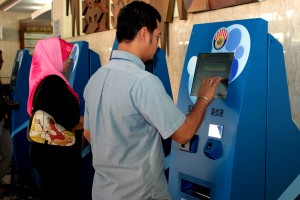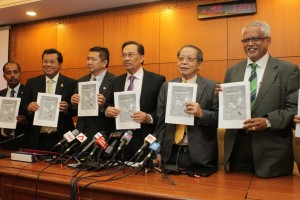By Ian Neoh Chee Hua
 Budget 2013 is certainly going to be an election-year budget aimed to keep the ruling Barisan National in power at any cost, as Prime Minister Najib Tun Razak prepares to call his first general election. Failure to do so will result in the end of Najib and the era of BN’s rule.
Budget 2013 is certainly going to be an election-year budget aimed to keep the ruling Barisan National in power at any cost, as Prime Minister Najib Tun Razak prepares to call his first general election. Failure to do so will result in the end of Najib and the era of BN’s rule.
The RM100 aid for students and RM500 BR1M handouts cost the Najib Administration more than RM3.1 billion. This was paid out to some 5 million low income households and students from Year One to Form Five between last year end and earlier this year.
Following that, Najib’s approval rating surged from 59% to 69%. However, Najib’s ratings slipped 5% to 64% after the Bersih 3.0 rally in April this year.
Not surprisingly, Najib is expected to announce a fresh round of cash handouts under Budget 2013 to generate the similar result and to regain voter support, in order to retain power.
Another reason for fresh handouts is to boost the flagging domestic economy in the midst of looming global economic crisis, as economic issues could easily weight down the popularity of ruling BN.
The Malaysian economy surprisingly recorded 5.4% strong growth in the second quarter of this year. This was mainly due to the rolling out of construction projects, civil servant salary hikes and government cash handouts which maintain a good momentum of growth in domestic demand.
Nonetheless, our economic outlook could turn sour in second half of this year due to the deterioration in external demand. Should the economy fall into recession, it is definitely bad news for Najib who prepares to fight for his first electoral mandate as PM.
More importantly, many ordinary Malaysians are not feeling the positive effects of economic growth despite our economy registering strong growth in the second quarter. This is because the positive impacts of first round handouts diminished at a faster pace. Presently, worries over economic uncertainty have overtaken the “feel good” effect.
This has prompted the Najib administration to make the second round of handouts together with other measures, via budget 2013, as necessary tools in stimulating domestic demand, in order to avoid any economic recession, as well as to ease the negative sentiments among voters.
People to pay the price
 While the cash handouts brought a sense of relief to the rakyat, but there’s a hidden price to pay: using goodies as a ‘silencer’ means BN is free to spend public money frivolously and without curtail.
While the cash handouts brought a sense of relief to the rakyat, but there’s a hidden price to pay: using goodies as a ‘silencer’ means BN is free to spend public money frivolously and without curtail.
Firstly, the BN government allocates a large portion of the budget for “populist” spending to create short-term prosperity as winning the election remains the priority. There’s not much left to go to productive investments or improving production capacity. Wily nily expenditure also adds pressure on the government’s debt burden.
The BN government is in a dilemma of decades’ long fiscal deficit and mounting national debts. Spending a huge amount on populist measures to ‘buy votes’ is a luxury the BN government cannot afford. This has left the government with little room to maneuver in the event of an external shock or global economic crisis.
Malaysia is one of the most vulnerable Asian economies should a ‘perfect storm’ of a disorderly debt default in Europe, a slowdown in China and the US, and rising tensions in the Middle East materialise, as pointed out by Roubini Global Economics in a report. The report also mentioned that Malaysia is among the lowest ranked in terms of monetary and fiscal capacity to respond to a crisis.
The Rakyat may suffer from a double blow economically (depletion of assets, massive unemployment and operations shut down) and socially (rising crimes, social disorder and poverty deterioration), as was the case in Europe’s fallen stars.
Lack of fiscal discipline
Secondly, BN government has long been recognized as a government with loose fiscal discipline and has a tendency to falling into uncontrolled public spending. Since taking over the reins as PM and Finance Minister in 2009, Najib has pursued an expansionary fiscal policy with record-breaking fiscal budgets, elastic debt ceilings and yearly over-spending.
Worse still, budget overruns are usually channeled into unproductive spending and in many cases, the public money were spent for personal gains or connected to corruption, irregularities or mismanagement. Wasteful and wanton spending of government departments and agencies was revealed by the annual Auditor–General reports.
The RM13.8 billion 2012 supplementary budget tabled in parliament this year involved the spending of public funds for private use, such as extra RM 1.5 million allocation to every BN MP for their constituencies election campaign purpose.
It was also squandered on unproductive activities such as RM30 million splashed on the National Brand Unit with a similar branding and promotion function as conducted by existing ministries such as Tourism Ministry and MITI.
The truth is that whether the fiscal budget deficit or over spending is financed through taxation or debt issuances, the Rakyat eventually have to pay the price. It is just a matter of paying taxes now or in the future.
The handout aim to “buy votes” rather than address the issue of cost of living. While the government’s one-off handouts can bring a sense of relief to Rakyat, eventually we are still confronted with mounting debts and financial pressures.
In fact, these living pressures are attributed to the BN government’s unfair public policies. High excise duties for cars and the lack of public transport to protect national car industry and toll concessinaires contributed to the mounting car debts and higher costs of living.
Privatisation of education, health and utilities sectors lead to rising cost of living and higher inflationary pressure. Unchecked housing prices contribute to property market woes, with most middle and low income earners unable afford a house.
Sustainable Policy Recommendations
 In view of inappropriate and inefficient use of public funds by the BN Government through budgetary system, Pakatan Rakyat has proposed a number of sustainable policy recommendations. These are expected to be more effective and efficient in managing our public finance and addressing the real needs of Rakyat, as opposed to the BN Government.
In view of inappropriate and inefficient use of public funds by the BN Government through budgetary system, Pakatan Rakyat has proposed a number of sustainable policy recommendations. These are expected to be more effective and efficient in managing our public finance and addressing the real needs of Rakyat, as opposed to the BN Government.
Firstly, Pakatan Rakyat calls for an independent Parliamentary Budget with objective and non-partisan advisors to provide Parliament with economic and budgetary analysis and information that would help Members of Parliament make important financial decisions. Public budget hearings should also be organised by this Office.
Meanwhile, Pakatan Rakyat also proposes a half-annual budget update provided by the Treasury and a serious review of the practice of the current government in tabling large supplementary budgets.
It is also necessary to form Budgetary Committees that specialise in particular ministries, to allow Budget deliberations of greater depth and length, and to exercise supervision over the Executive or government departments.
These recommendations are aimed to address the fiscal discipline issues of the BN Government that lead to decades-long fiscal budget deficits and frequently over-spending. Transparency is needed to ensure the government manages public funds properly and efficiently.
 Secondly, Pakatan Rakyat calls for a full-time Finance Minister to steer the economy in the face of the looming global crisis.
Secondly, Pakatan Rakyat calls for a full-time Finance Minister to steer the economy in the face of the looming global crisis.
The practice of the Prime Minister holding a concurrent finance portfolio started in 1998, first by former PM Mahathir Mohamad, then Abdullah Batawi and Najib have continue with this practice. This effectively allows the PM ful control over the Executive and National Financial issues without any check-and-balance mechannism in place.
The Prime Minister and Finance Minister positions must be held by separate people to ensure accountability in handling the country’s funds. As the Prime Minister is attending to national affairs, a full-time Finance Minister is needed to focus on the economy. For the same reason, the Chief Executive Officer (CEO) of a company is never the same person as the Chief Financial Officer (CFO).
The separation of powers between the Executive and National Finance will restore a check-and-balance in the government system. This is important to unsure public fund or budget allocations are directed toward productive investments or improving production capacity, instead of being squandered away.
This is especially true when general election comes around the corner, the rulling government would inevitably use public fund for the benefit of their own political parties.
To ensure the Finance Minister plays his role properly, Pakatan Rakyat calls on the Treasury to act as a neutral body to provide detailed budgetary information and a half-annual budget update to both the governing and opposition parties. Thus members of Parliament could have a better picture on our national financial health and make sure the government uses public funds in a proper and efficient manner.
The recommendations above are urgently needed to strengthen the authority, independence and capacity of budget oversight institutions, also allowing the voice of the public as a further check and balance.
Lastly, some recommendations by Pakatan Rakyat to be detailed in its Alternative Budget 2013 are strategies for cheaper housing, strategies for cheaper cars (the removal of excise duties and the auctioning of APs), as well as police redeployment to cut the crime rate. These proposals aim to address the real needs of Rakyat in relation to cost of living and safety issues. -The Rocket



